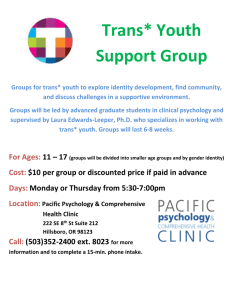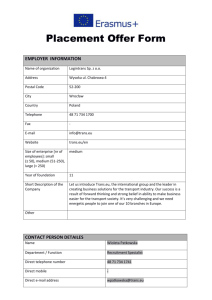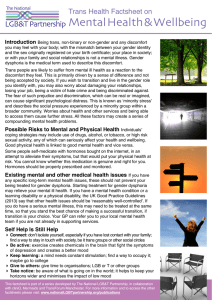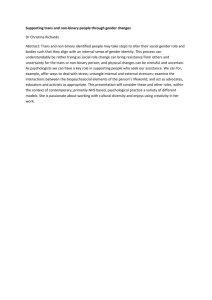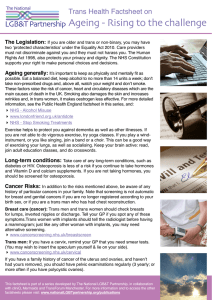Exercise and Nutrition LGB&T Partnership Trans Health Factsheet on
advertisement
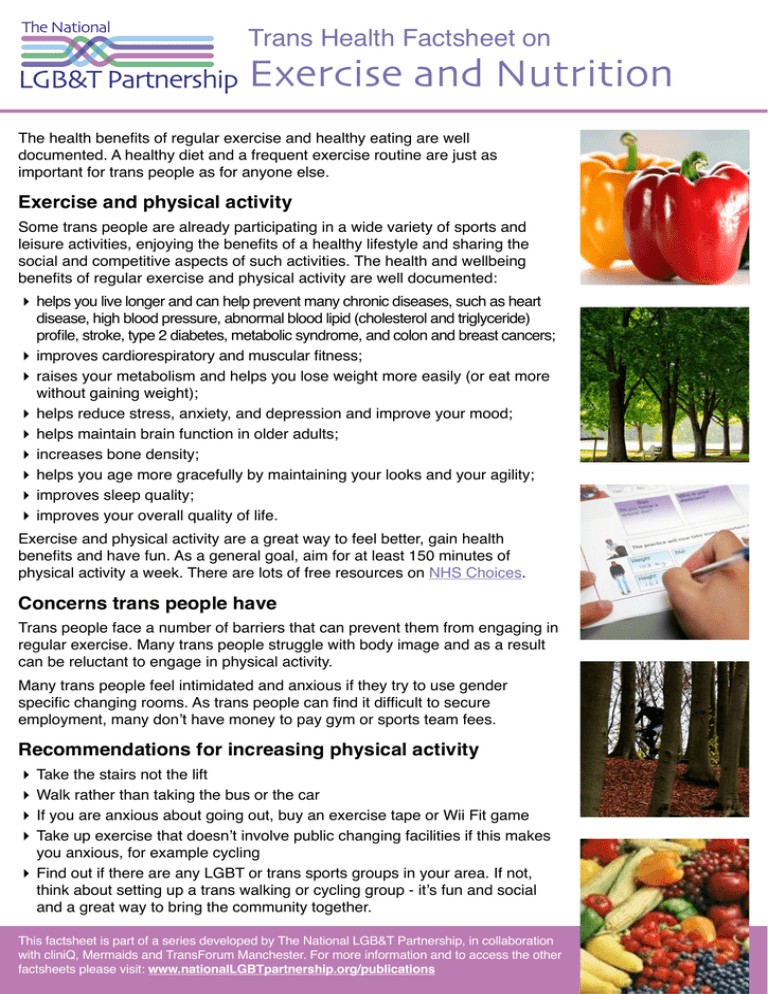
The National LGB&T Partnership Trans Health Factsheet on Exercise and Nutrition The health benefits of regular exercise and healthy eating are well documented. A healthy diet and a frequent exercise routine are just as important for trans people as for anyone else. Exercise and physical activity Some trans people are already participating in a wide variety of sports and leisure activities, enjoying the benefits of a healthy lifestyle and sharing the social and competitive aspects of such activities. The health and wellbeing benefits of regular exercise and physical activity are well documented: helps you live longer and can help prevent many chronic diseases, such as heart disease, high blood pressure, abnormal blood lipid (cholesterol and triglyceride) profile, stroke, type 2 diabetes, metabolic syndrome, and colon and breast cancers; improves cardiorespiratory and muscular fitness; raises your metabolism and helps you lose weight more easily (or eat more without gaining weight); helps reduce stress, anxiety, and depression and improve your mood; helps maintain brain function in older adults; increases bone density; helps you age more gracefully by maintaining your looks and your agility; improves sleep quality; improves your overall quality of life. Exercise and physical activity are a great way to feel better, gain health benefits and have fun. As a general goal, aim for at least 150 minutes of physical activity a week. There are lots of free resources on NHS Choices. Concerns trans people have Trans people face a number of barriers that can prevent them from engaging in regular exercise. Many trans people struggle with body image and as a result can be reluctant to engage in physical activity. Many trans people feel intimidated and anxious if they try to use gender specific changing rooms. As trans people can find it difficult to secure employment, many don’t have money to pay gym or sports team fees. Recommendations for increasing physical activity Take the stairs not the lift Walk rather than taking the bus or the car If you are anxious about going out, buy an exercise tape or Wii Fit game Take up exercise that doesn’t involve public changing facilities if this makes you anxious, for example cycling Find out if there are any LGBT or trans sports groups in your area. If not, think about setting up a trans walking or cycling group - it’s fun and social and a great way to bring the community together. This factsheet is part of a series developed by The National LGB&T Partnership, in collaboration with cliniQ, Mermaids and TransForum Manchester. For more information and to access the other factsheets please visit: www.nationalLGBTpartnership.org/publications Trans Health Factsheet on Exercise and Nutrition Questions you might want to ask your sports facility/gym Do they have appropriate areas for trans/gender variant people to change in: mixed changing and/ or single-sex changing facilities with cubicles (changing villages) which offer greater privacy and ensure people feel safe? Are staff members of the sports facilities fully trained and do they have a good understanding of trans and gender diversity? Is there an equal opportunities policy in place? If it’s an LGBT sports club group, you may wish to check out how trans-inclusive they are before going. Ask if they have any trans members. You might also ask if they have any trans-only sessions. Healthy eating and nutrition recommendations These practical tips cover the basics of healthy eating, and can help you make healthier choices: Try to eat at least five portions of fruit and vegetables a day. Keep processed foods high in fat and sugar to a minimum. We all need some fat in our diets but try to keep saturated fat to a minimum. Eat more fish: it’s a good source of protein and vitamins. Try to eat less salt; even if you don’t add salt to your food there can be high amounts in processed foods - check the labels. Try to eat more starchy foods like potatoes, cereals, bread and pasta; wholemeal varieties are better for you and a good source of fibre which can help you stay full longer. Keep hydrated: try to drink eight glasses of water a day. Further tips Never miss breakfast: a healthy breakfast is part of a balanced diet. Listen to your body and only eat when you begin to feel hungry. Eat moderate amounts. Avoid binge-eating or starvation diets. If you are trying to lose weight and are concerned about calorie levels and hormones, have a chat to your gender clinic, general practitioner or practice nurse. Some trans people suffer from eating disorders and concerns about body image. Professional help may be needed if you are constantly thinking about your weight, compulsively dieting or eating or exercising, or stressed about how your body looks. For more information go to: www.nhs.uk/Livewell/Goodfood/Pages/eatwell-plate.aspx Further Information www.pridesports.org.uk includes a directory of LGBT sports clubs. Transsexual and Transgender Expertise Use of Sports and Leisure Facilities by Trans People: Press for Change: www.transfaithonline.org/fileadmin/TFteaching/P4C_Trans-Sports-and-Leisure-1.pdf Some leisure centres have trans-friendly arrangements. www.nhs.uk/conditions/stress-anxiety-depression/pages/mental-benefits-of-exercise.aspx The National LGB&T Partnership This factsheet is part of a series developed by The National LGB&T Partnership, in collaboration with cliniQ, Mermaids and TransForum Manchester. For more information and to access the other factsheets please visit: www.nationalLGBTpartnership.org/publications
